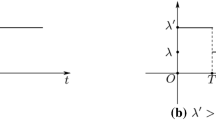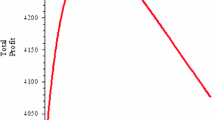Abstract
This paper considers an inventory mechanism with a non-deterministic short-term price discount. In the mechanism, the supplier has a tendency to offer retailers a short-term price discount for a future occasion. Subsequently, when the discount occurs, the discount stock would start to reduce gradually. Therefore the discount might terminate ahead of schedule once the discount stock is depleted, which means that the discount possibility will gradually decrease from 1 ever after the start of the discount. For this system, to maximize the retailer’s profit, we establish an optimal replenishment and stocking strategies model. Based on the retailer’s cost-benefit analysis, we present a solution method for the model and provide an optimal ordering policy to the retailer. The given numerical experiments illustrate the validity of the model.










Similar content being viewed by others
References
Arcelus, F.J., Shah, N.H., Srinivasan, G.: Retailers response to special sales: price discount vs trade credit. Omega 29(5), 417–428 (2001)
Arcelus, F.J., Shah, N.H., Srinivasan, G.: Retailer’s pricing, credit and inventory policies for deteriorating items in response to temporary price/credit incentives. Int. J. Prod. Econ. 81–82, 153–162 (2003)
Ardalan, A.: Optimal ordering policies in response to a sale. IIE Trans. 20, 292–294 (1988)
Ardalan, A.: Optimal prices and order quantities when temporary price discounts result in increase in demand. Eur. J. Oper. Res. 72, 52–61 (1994)
Aull-Hyde, R.: Evaluation of supplier-restricted purchasing options under temporary price discounts. IIE Tran. 24, 184–186 (1992)
Aull-Hyde, R.: A backlog inventory model during restricted sale periods. J. Oper. Res. Soc. 47(9), 1192–1200 (1996)
Baker, R.C., Vilcassim, N.: Continuos review price change inventory model. Prod. Invent. Manag. 24, 67–72 (1983)
Cárdenas-Barrón, L.E., Smith, N.R., Goyal, S.K.: Optimal order size to take advantage of a one-time discount offer with allowed backorders. Appl. Math. Model. 34, 1642–1652 (2010)
Chang, H.J., Lin, W.F., Ho, J.F.: Closed-form solutions for Wee’s and Martin’s EOQ models with a temporary price discount. Int. J. Prod. Econ. 131, 528–534 (2011)
Chu, P., Chen, P.S., Niu, T.: Note on supplier-restricted order quantity under temporary price discounts. Math. Methods Oper. Res. 58, 141–147 (2003)
Davis, R.A., Gaither, N.: Optimal ordering policies under conditions of extended payment privileges. Manag. Sci. 31, 499–509 (1985)
Fan, S.J.: A new extracting formula and a new distinguishing means on the one variable cubic equation. J Hainan Teach. Coll. 2(2), 91–98 (1989)
Gaither, N., Park, M.S.: Analysis of constrained, on-time, multi-item discount offers. IIE Tran. 23(3), 228–235 (1991)
Goyal, S.K.: Economic ordering policy during special discount periods for dynamic inventory problems under certainty. Eng. Costs Prod. Econ. 20, 101–104 (1990)
Hsu, W.K., Yu, H.F.: EOQ model for imperfective items under a one-time-only discount. Omega 37, 1018–1026 (2009)
Hu, F., Lim, C.C., Lu, Z.: The retailer’s optimal decision on order quantity and credit periods under two-level trade credit policy. J. Glob. Optim. 62, 833–852 (2015)
Kindi, M.A., Sarker, B.R.: Optimal inventory system with two backlog costs in response to a discount offer. Prod. Plan. & Cont. 22, 25–333 (2011)
Lev, B., Weiss, H.J.: Inventory models with cost changes. Oper. Res. 38, 56–63 (1990)
Sari, D.P., Rusdiansyah, A., Huang, L.: Models of joint economic lot-sizing problem with time-based temporary price discounts. Int. J. Prod. Econ. 139(1), 145–154 (2012)
Sarker, B.R., Kindi, M.A.: Optimal ordering policies in response to a discount offer. Int. J. Prod. Econ. 100(2), 195–211 (2006)
Shaposhnik, Y., Herer, Y.T., Naseraldin, H.: Optimal ordering for a probabilistic one-time discount. Eur. J. Oper. Res. 244(3), 803–814 (2015)
Taleizadeh, A.A., Pentico, D.W., Aryanezhad, M., Ghoreyshi, S.M.: An economic order quantity model with partial backordering and a special sale price. Eur. J. Oper. Res. 221(3), 571–583 (2012)
Tersine, R., Schwarzkopf, A.: Optimal stock replenishment strategies in response to temporary price reductions. J. Bus. Logist. 10(2), 123–145 (1989)
Thi, H.A.L., Tran, D.Q.: New and efficient algorithms for transfer prices and inventory holding policies in two-enterprise supply chains. J. Glob. Optim. 60, 5–24 (2014)
Wang, Y.J., Sun, X.F., Meng, F.X.: On the conditional and partial trade credit policy with capital constraints: a Stackelberg model. Appl. Math. Model. 40, 1–18 (2016)
Wang, C.W., Wang, Y.J.: A superlinearly convergent projection method for constrained systems of nonlinear equations. J. Glob. Optim. 40, 283–296 (2009)
Waters, C.D.J.: Inventory Control and Management. Wiley, New Jersey (2003)
Wee, H.M., Yu, J.: A deteriorating inventory model with a temporary price discount. Int. J. Prod. Econ. 53(1), 81–90 (1997)
Zhang, Y.G., Tang, X.W.: Retailer’s order strategy of delay in payments under cash discount and capital constraints. Syst. Eng. 27, 30–34 (2009)
Acknowledgements
The authors are in debt to two anonymous referees for numerous insightful comments and suggestions, which have greatly improved the paper.
Author information
Authors and Affiliations
Corresponding authors
Additional information
This work is supported by the Natural Science Foundation of China (11671228, 71471101) and Shandong Provincial Natural Science Foundation (ZR2015GZ008).
Rights and permissions
About this article
Cite this article
Wang, Y., Gao, H. & Xing, W. Optimal replenishment and stocking strategies for inventory mechanism with a dynamically stochastic short-term price discount. J Glob Optim 70, 27–53 (2018). https://doi.org/10.1007/s10898-017-0522-0
Received:
Accepted:
Published:
Issue Date:
DOI: https://doi.org/10.1007/s10898-017-0522-0




